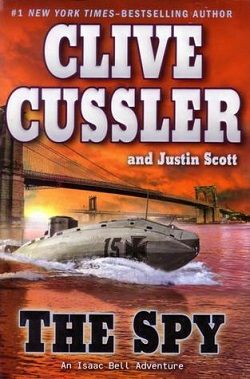Summary

The Spy (Isaac Bell 3)
by Clive Cussler
It is 1908, and international tensions are mounting as the world plunges toward war. When a brilliant American battleship gun designer dies in a sensational apparent suicide, the man's grief-stricken daughter turns to the legendary Van Dorn Detective Agency to clear her father's name. Van Dorn puts his chief investigator on the case, and Isaac Bell soon realizes that the clues point not to suicide but to murder. And when more suspicious deaths follow, it becomes clear that someone-an elusive spy-is orchestrating the destruction of America's brightest technological minds... and the murders all connect to a top- secret project called Hull 44.
But that is just the beginning. As the intrigue deepens, Bell will find himself pitted against German, Japanese, and British spies, in a mission that encompasses dreadnought battleships, Teddy Roosevelt's Great White Fleet, Chinatown, Hell's Kitchen, and the Brooklyn Navy Yard. Isaac Bell has certainly faced perilous situations before, but this time it is more than the future of his country that's at stake- it's the fate of the world.
.
Read
The Spy (Isaac Bell 3) on http://kissnovel.net
Martial Peak Reviews
Clive Cussler's The Spy, the third installment in the Isaac Bell series, plunges readers into a world on the brink of chaos. Set against the backdrop of 1908, a time when international tensions were escalating and the specter of war loomed large, Cussler crafts a narrative that is both thrilling and thought-provoking. The story begins with the tragic death of a brilliant American battleship gun designer, which is initially ruled a suicide. However, the designer's daughter, desperate to clear her father's name, seeks the expertise of the Van Dorn Detective Agency, leading to a gripping investigation that reveals a far more sinister plot at play.
One of the most compelling aspects of The Spy is its exploration of the themes of loyalty, betrayal, and the quest for truth. Isaac Bell, the agency's chief investigator, embodies the archetype of the relentless detective, driven not only by a sense of duty but also by a personal commitment to justice. As he delves deeper into the case, Bell encounters a web of espionage that spans multiple nations, including Germany, Japan, and Britain. This international intrigue serves as a reminder of the precarious balance of power during this historical period, making the stakes feel incredibly high.
Cussler’s ability to weave historical facts with fiction is commendable. The inclusion of real events, such as Teddy Roosevelt's Great White Fleet and the technological advancements of the time, adds a layer of authenticity to the narrative. The author meticulously details the workings of the Brooklyn Navy Yard and the significance of the top-secret project known as Hull 44, which serves as the crux of the conspiracy. This blend of history and fiction not only enriches the story but also educates readers about a pivotal moment in American history.
The character development in The Spy is another highlight. Isaac Bell is portrayed as a multi-dimensional character, grappling with the weight of his responsibilities while navigating the treacherous waters of espionage. His interactions with the grief-stricken daughter of the deceased designer reveal his empathetic side, showcasing his commitment to uncovering the truth, no matter the personal cost. The supporting characters, including various spies and allies, are well-crafted and add depth to the narrative. Each character brings their own motivations and complexities, making the story more engaging.
As the plot unfolds, Cussler expertly builds tension through a series of unexpected twists and turns. The pacing is brisk, keeping readers on the edge of their seats as Bell races against time to thwart the plans of an elusive spy. The action sequences are vividly described, immersing readers in the high-stakes world of espionage and military innovation. Cussler's knack for creating suspenseful scenarios is evident, as Bell faces perilous situations that test his ingenuity and resolve.
Moreover, the novel delves into the moral ambiguities of espionage. As Bell confronts various spies, the lines between right and wrong blur, prompting readers to consider the ethical implications of loyalty to one's country versus the value of human life. This theme resonates deeply, especially in a contemporary context where issues of national security and personal ethics continue to be hotly debated.
In comparison to other works in the espionage genre, The Spy stands out for its historical context and character-driven narrative. While authors like Robert Ludlum and John le Carré often focus on the psychological aspects of espionage, Cussler leans into the adventure and action elements, creating a fast-paced thriller that is both entertaining and enlightening. The blend of history, technology, and espionage in Cussler's work invites comparisons to the likes of Dan Brown, who similarly intertwines historical facts with thrilling narratives, though Cussler's approach is more grounded in the action-adventure tradition.
Overall, The Spy is a testament to Clive Cussler's storytelling prowess. The novel not only entertains but also prompts readers to reflect on the complexities of loyalty, the pursuit of truth, and the impact of technological advancements on society. With its rich historical backdrop, well-developed characters, and a plot that keeps readers guessing until the very end, this book is a worthy addition to the Isaac Bell series and a must-read for fans of historical thrillers.
In conclusion, The Spy is more than just a tale of espionage; it is a reflection on the human condition, the sacrifices made in the name of progress, and the enduring quest for justice. Cussler's ability to blend action with thought-provoking themes ensures that this novel will resonate with readers long after they turn the final page. Whether you are a longtime fan of Cussler or new to the Isaac Bell series, this book promises an exhilarating journey through a pivotal moment in history.
























Reviews 0
Post a Reviews: